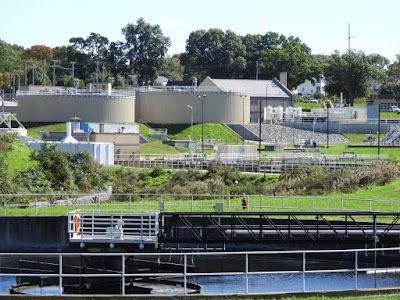Narragansett Bay Commission adopts anaerobic digestion system
The Narragansett Bay Commission’s (NBC) Bucklin Point Wastewater Treatment Facility recently installed a new Combined Heat and Power system to reduce its dependence on the energy grid by approximately 36%. Combined Heat and Power (CHP) is the concurrent production of electricity and useable thermal energy from a single energy source. The CHP system will allow NBC to become more energy-efficient and reduce costs.
The heart of the new system is a 644 kW (gross capacity) engine-generator that operates on biogas created through anaerobic sludge digestion. Anaerobic digestion is a process in which microorganisms break down biodegradable materials in an absence of oxygen. It produces a combustible biogas that is in turn used to generate energy. The new CHP system will use a blend of 59% biogas and 41% natural gas.

The Bucklin Point Wastewater Treatment Facility is Rhode Island’s second-largest wastewater treatment facility. It treats wastewater through biological nutrient removal and ultraviolet disinfection. The facility required an average of 1.5 MW of power throughout 2019, which equates to an annual electric bill of $1.8 million. Historically, the Bucklin Point facility has used biogas only for heating and has safely flared any excess.
The total cost of the CHP project was $6,440,000. The NBC received several financial incentives, including $682,300 from National Grid, $200,000 from the Renewable Greenhouse Gas Initiative (RGGI) and $80,000 from the Rhode Island Renewable Energy Fund. In addition, NBC will sell the electric renewable energy credits from the project to help pay for it.
“We have galvanized a strong commitment from every part of the organization,” said NBC Chairman Vincent Mesolella. “The Board of Commissioners made a commitment to pursuing 100% sustainable energy for the NBC nearly twenty years ago. With each new clean energy project, the NBC gets closer to this ambitious goal. This commitment makes sense from an environmental standpoint, and also benefits the NBC’s ratepayers.”
The energy the CHP system produces will also provide most of the heat necessary to warm the anaerobic digesters that power it. Only during the coldest part of the winter will the system rely on other sources of heating. At that time, natural gas-fired boilers will provide additional heat.
The project was completed in late 2020 and is expected to go online for continuous operation in the first quarter of 2021
